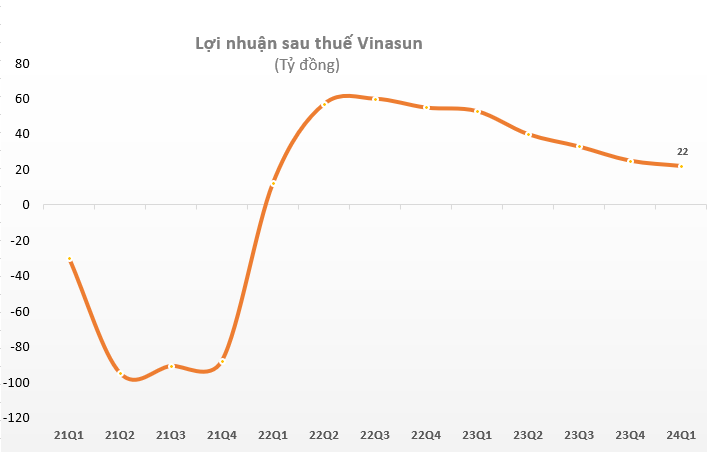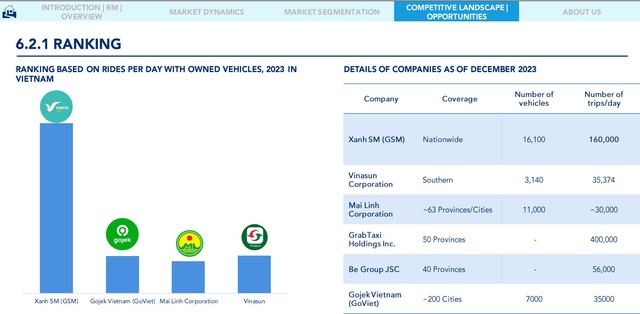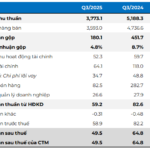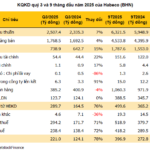Vinasun Reports Q1 2024 Revenue Decline Amidst Intense Competition
Vinasun Corporation (VNS), a leading taxi operator in Vietnam, reported a 15% decrease in revenue for the first quarter of 2024, with total revenue reaching VND 278 billion. All business segments experienced a decline compared to the same period in the previous year. Notably, passenger transportation services, the core revenue generator for Vinasun, witnessed a reduction of over 14% to VND 230 billion. Despite a slight decrease in cost of sales, the company’s gross profit still fell by 27% to VND 55 billion.
Vinasun’s financial revenue dropped by 56% to VND 4.4 billion, while financial expenses, sales expenses, and administrative expenses all increased. Consequently, the company’s after-tax profit recorded a significant decline of 58% year-over-year, reaching over VND 22 billion. This represents Vinasun’s lowest quarterly profit in the past eight quarters, dating back to the first quarter of 2022.

For 2024, Vinasun has set a target of VND 1,106 billion in total revenue, reflecting a decrease of 11%. The profit target, however, is expected to experience a substantial 47% drop to VND 81 billion. This decline is attributed to intense competition in the taxi sector and the company’s revised policies for driver support and revenue sharing.
Vinasun, established in 2003, once dominated the Southern Vietnam taxi market, generating annual revenue in the trillions of VND. However, the rapid emergence and growth of ride-hailing platforms such as Grab and GoJek have significantly eroded the market share of the traditional taxi company. Consequently, Vinasun’s financial performance has been on a downward trend since 2016.
The COVID-19 pandemic further exacerbated Vinasun’s challenges, pushing it to the brink of mandatory delisting due to consecutive years of losses (VND 480 billion in 2020 and 2021). The company’s “at all costs” focus on profitability helped it return to profitability in the first quarter of 2022.
However, the company’s post-pandemic recovery has been short-lived, as Vinasun now faces intense competition from Xanh SM, the first fully electric taxi brand in Vietnam. Vinasun’s profitability has declined noticeably since the second quarter of 2023, coinciding with the launch of Xanh SM in Ho Chi Minh City.
According to Mordor Intelligence, Xanh SM’s entry into the market in 2023 sparked a revolution in Vietnam’s ride-hailing industry, reshuffling rankings and market shares among service providers. Xanh SM captured the second-largest market share in the fourth quarter of 2023, just over seven months after its inception.

Xanh SM’s rapid expansion and leadership in the electric vehicle segment have raised concerns among Vinasun shareholders, who raised questions about the potential impact on their company at the recent annual shareholder meeting in 2024.
In response, Tran Anh Minh, Vinasun’s Deputy General Director, acknowledged the market share loss to Xanh SM. However, he also highlighted that besides direct competition from taxi operators, declining consumer spending was another challenge affecting the company’s 2024 performance targets.
To address these challenges and enhance its competitiveness, Vinasun plans to invest in 700 hybrid taxis in 2024 (with an estimated investment of VND 630-650 billion), with the potential to increase to 1,000 vehicles if feasible. This move aligns with Vinasun Taxi’s long-term strategy of improving service quality and delivering exceptional customer experiences.
Furthermore, Vinasun Taxi is actively advocating with authorities to pilot a project involving three-wheeled electric vehicles for passenger transport. This initiative aims to better meet the needs of passengers in urban areas with narrow alleyways and small streets.
“We believe that implementing a hybrid vehicle replacement plan and exploring the introduction of three-wheeled electric vehicles will provide positive and memorable experiences for our customers. It will also contribute to creating a clean, safe, and convenient transportation environment, supporting a sustainable future,” emphasized Tran Anh Minh.





































